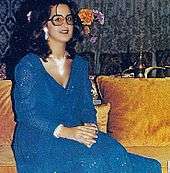Aziza Jalal
Aziza Jalal (Arabic: عزيزة جلال, Aziza Jalal; born 15 December 1958)[2] is a Moroccan Arabic pop singer.
Aziza Jalal عزيزة جلال | |
|---|---|
 Aziza Jalal | |
| Background information | |
| Birth name | Aziza Jalal |
| Born | 15 December 1958 Meknès, Morocco |
| Genres | Classical Arabic, Egyptian pop. |
| Occupation(s) | Singer, record producer |
| Years active | 1975 - 1985 – Return 2019 - present [1] |
| Labels | Mazzika Alam El Phan Sout El-Hob Record Label Sawt El Phan |
Career
Aziza Jalal is an iconic Arabic singer from Morocco, she currently lives in Saudi Arabia and is a Saudi national.[3] Before fame and marriage, the singer dedicated her life to the study of music. Young Aziza Jalal studied music in Meknes before participating in a singing competition called Mawahib (Talents) supervised by renowned Moroccan singer Abdelnabi Al Jirari in 1975. During the competition, the singer performed songs of well-known Egyptian and international Arab icons, such us Shadia and Ismahan.[4] In a singing career that lasted from 1975-1985, Aziza Jalal became a popular classical singers across the Arab world before deciding to give up the artistic scene for a life of piety with a Saudi husband. She was known to be King Hassan II of Morocco's favourite singer, and often appeared on Moroccan television and at state occasions singing nationalistic, pan-Arab, and Islamic-themed material.[5]
The singer had made a name for herself as one of the top Arab singers in the 70s and 80s. Not too little to late, her vocals have made headlines again as she astonished the world by singing a few verses from her song during the television show. Jalal’s song “Mestaniyak” was covered by Lebanese singer Nancy Ajram, one of the most popular Arab artists. The song’s lyrics come from the repertoire of the great Egyptian musician Mohamed Abdelouahab. The composer of the song was renowned musician Baligh Hamdi.
Aziza Jalal, however, had several other famous songs, including Min Hakek T’atebny (You have the right to blame me,) and Houa El Hob Le’baa (Love is a Game.)
Jalal’s early songs achieved commercial success in the UAE and in Egypt, and with the help of songwriter and poet Abdel Wahab Mohammed and artist Sayed Makkawi, among others, she quickly became a household name in the entire Arab world.

Retired at 26
In 1985, Aziza Jalal chose to leave the stage. Aziza Jalal married a Saudi businessman Ali bin Butti al-Ghamdi who gave her the right to decide whether or not she wants to retire. She didn't think much into it and decided to leave. She stated that wasn't a decision she regrets.[6] The proposal suddenly ended her career in the music industry, leaving her fans disappointed, knowing that she could have added even more hits to her already impressive list of songs.

Returned to stage 2019
May 22, 2019 marked a surprise for the Arab World.[8] It was the day that Moroccans and fans across the Arab world had the chance to meet again with the prominent Moroccan arabic singer, Aziza Jalal, who was out of the spotlight for 34 years. The singer made her first appearance since 1985 on a television show aired by MBC television channel. The TV show is called “Likaa mina sifr” or “meeting from scratch.”
In the show, the singer also wowed audiences across the world when she performed her legendary song “Mestanyak,” translated as “I am waiting for you” in English, with the same passion and maybe a little bit more.
The interview with Aziza Jalal was also posted by the television show on Youtube. The interview generated more than 1 million views and thousand of comments.
After a 34-year hiatus, Jalal returned to the stage on Thursday 26 December 2019 at Winter at Tantora.[9] Jalal's much anticipated performance started at 10 p.m.[10] Aziza Jalal, who has kept a low profile for more than 30 years, rekindled emotions as generations were enchanted by her voice and songs.[11] She thanked her fans “for coming to see me after a long hiatus. I’ve never been away from you, you have always been in my heart. I’m back today because of your love for me. I decided to come back to participate in these joyful events in our country.” [12]
During the concert,[13] Aziza Jalal performed “Love is not a game” composed by Muhammad Al-Mouji and written by Mamoun Al-Shinawai, and "Waiting for you (Mestaniyak) which the audience enjoyed immensely. She also performed many of her classics. Her message to the youth was: “Hear us out because we are the past, and the past needs the present and the future, hear us out so that we hear you out.”.[14]
Discography
Studio albums
| Song | الأغاني |
|---|---|
| Halakti Ayouni Hna W Hnak | حلقت عيوني هنا وهناك |
| Ahila Al Maghreb | عاهل المغرب |
| Batala Al Qodss | بطل القدس |
| Ya Laylo Toul | ياليـل طول |
| Al Aido Ada | العيد عاد |
| Annouro Mawsolo | النور موصول |
| Yorani Liarchika | يغن لعرشك |
| Min Koli Dakit Alb | من كل دقة قلب |
| Sayidi Ya Sid Sadati | سيدي ياسيد ساداتي |
| Gazayil Follah | غزيل فله |
| Ya Shoue | ياشوق هزني هوى الشوق |
| Ella Aweel Matkabilna | إلا أول ماتقابلنا |
| Howa El Hobi Liaba | هو الحب لعبه |
| Waltakayna | والتقينا |
| Zayi Manta | زي مانت |
| Minak Wi Eleek | منك واليك |
| Mestaniyak [15] | مستنياك |
| Min Haak Tiatibni | من حقك تعاتبني |
| Haramti El Hob | حرمت الحب عليه |
| Rouhi Feek | روحي فيك |
| Azzamzamiya | قصيدة الزمزمية |
| Mawlay | مولاي |
| Ghali Ya Hassan | غال ياحسن |
| Inta Omri | إنت عمري |
| Arouh Limin | أروح لمين |
| Al Atlal | الأطلال |
| Layali El Onss | ليالي الأنس |
| Youmi El Massira | ِمِن يِنسى يوم المسيرة |
| Official song of the Pan Arab Games 1985 | 1985 الأغنية الرسمية لإفتتاح الألعاب العربية |
| Man Ana | من أنا؟ |
References
- Aziza Galal Arab singer Aziza Jalal returns to stage at Winter at Tantora.
- Aziza Galal sur alrai.com, consulté le 15 août 2014.
- "عزيزة جلال.. العفوية والأسلوب النوذجي الفاخر!". جريدة الرياض (in Arabic). Retrieved 2018-03-19.
- Moroccan Icon Aziza Jalal Makes First Appearance 34 Years After Retiring.
- "Pop Culture in North Africa and the Middle East: Entertainment and Society around the World". publisher.abc-clio.com. Retrieved 2018-03-19.
- ""يحيى يعيش" وpasse-partout وManipulation". الأخبار (in Arabic). Archived from the original on 2015-08-19. Retrieved 2018-03-19.
- Attend Winter at Tantora - one of the most anticipated events in Saudi Arabia
- l Likaa mina sifr with Aziza Jalal
- Arab singer Aziza Jalal returns to stage at Winter at Tantora
- Legendary singer Aziza Jalal dazzles crowds at Saudi Arabia’s Tantora festival
- Le retour insoupçonné de Aziza Jalal
- Le grand retour d'Aziza Jalal
- Aziza Jalal is back on stage
- Aziza Jalal: le “come back” après plus de trente ans
- عزيزة جلال - أشهر من جلست على كرسي الانتظار
Further reading
- Pop Culture in North Africa and the Middle East: Entertainment and Society around the World, by Andrew Hammond, Series: Entertainment and Society around the World, 2017 - 319 pages. ISBN 1440833834, 978-1440833830
- الرماد والموسيقى: حفريات في ذاكرة غنائية عربية, واصل، أحمد, دار الفرابي، 2009 - ISBN 9953713340, 9789953713342-
- Alif bāʼ, Volume 10, by Karīm Irāqī, Publisher, Dār al-Jamāhīr lil-Ṣiḥāfah, 1977, Indiana University - Digitized on 16 July 2010
- Iraqi Maqam voices of women: an analytical study of the critical technical experience of Iraqi women in singing Almqami, by Hussein Azami, by Hussein Azami, AIRP, 2005 - 316 pages. ISBN 9953366772, 9789953366777
- Songs and stories, by Karīm Irāqī, by Karīm Irāqī, Company Whites of Arts and Letters, Volume 1, Aghānī wa-ḥikāyātuhā, Karīm ʻIrāqī -
- La condition de la femme au Maroc, by Abderrazak Moulay Rchid, Volume 33 of Collection de la Faculté des sciences juridiques, économiques et sociales: Série de langue française Issue 33 of Collection: Série de langue française, Jamiʻat Muḥammad V. Kullīyat al-Huqūq wa-al-ʻUlūm al-Iqtisādiyah wa-al-Siyāsiyah, Editions de la Faculté des sciences juridiques, économiques, et sociales de Rabat, 1985 - . (in French)